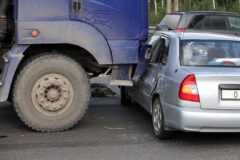How Much Can I Recover in A Truck Accident Claim?

Because every case is unique to the person who files a claim, an exact average financial compensation for a truck accident settlement doesn’t exist. However, if you want to get a general idea of how much your personal injury case is worth, you can calculate an estimate by adding up the economic and non-economic damages you endured.
Typically, calculating your damages is something a truck accident lawyer will do for you after you hire them. They will review your case’s specific facts and discuss the damages you can recover under South Carolina law.
What Should I Know Before Accepting a Truck Accident Settlement?
You should consider the following factors before accepting a settlement:
- What are all the damages you have sustained since the truck accident?
- Are you still recovering from injuries? Do you have permanent injuries now that will affect your future life?
- Will the settlement cover all current and future damages?
- Can you continue negotiating for a higher payment, or do you need to file a lawsuit against the at-fault party?
- Has the statute of limitations already expired to file a lawsuit?
Do Economic Damages Cover All Losses from an Accident?
Economic damages are the easiest to calculate as they cover damages that have a financial value, including:
- Current medical expenses such as doctor’s visits, emergency room costs, and treatment.
- Future medical costs like surgeries or physical therapy
- Property damage, including vehicle repair or replacement costs
- Present and future loss of income
- Reduced income if your injuries are long-term and require you to take a lower-paying job
Any other specific financial losses you sustained in your truck accident can be calculated by a lawyer who handles your case.
What Evidence Do I Need for Economic Damages?
You can prove and calculate your economic damages by having the following:
- Bank statements
- Tax returns, W-2s, 1099s, or any other salary-related documents
- Receipts
- Medical bill statements
An attorney will help you gather all the evidence necessary to ensure you maximize your settlement.
How are Non-Economic Damages Calculated in Settlements?
While economic damages cover the financial losses you sustained, non-economic damages cover the physical, mental, and emotional damage that resulted from your truck accident. These are not as easily calculated as they don’t involve a monetary price like economic damages. Some examples include:
- Diminished quality of life
- Loss of enjoyment
- Pain and suffering from both physical and emotional pain
- Loss of consortium
- Any losses that result from a permanent disability, including disfigurement
- Emotional distress
Having a lawyer calculate your non-economic damages is the best choice because they are hard to define, and you want to make sure you don’t lowball yourself.
What Evidence Do I Need for Non-Economic Damages?
Even though non-economic damages are a subjective value, you can prove you sustained them with the following evidence:
- Photographs that show the severity of your injuries
- Videos that prove you now have difficulty or changes in your daily activities
- Journal recordings that describe what you experienced after a truck accident
- A psychological evaluation performed by a mental health professional
- Witness statements from people who knew you before the accident and could describe any changes that have occurred.
What is the Statute of Limitations for South Carolina
The statute of limitations refers to the timeframe for filing a lawsuit after a personal injury accident happens. In South Carolina, this is outlined in S.C. Ann. § 15-3-530, which sets the deadline as three years from the date of an accident. Some exceptions can apply to this rule. However, if you try to file a lawsuit after three years, your case will most likely be dismissed.
Final Thoughts
Truck accidents often end in serious, life-altering injuries, and the settlement you are awarded should reflect the enormity of the damages you have suffered. An experienced truck accident lawyer will work to help you recover the full amount you are owed. While you focus on healing, they can focus on gathering evidence, calculating damages, and negotiating with all parties involved.






